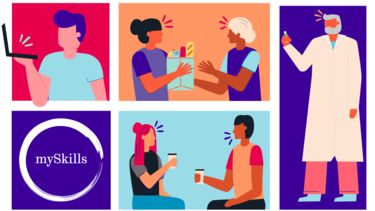Managing failure
Guidance and resources if you have failed an exam or assessment including, finding and accessing support, how you can prepare for resits, academic skills and wellbeing, and experiences of managing failure.
Find support from the University
Failing an exam or assessment can come as a shock, or disappointment, and may even feel catastrophic at the time. It’s important to remember that failing at something does not make you a failure - and support is available from the University to help you when things haven’t gone to plan.
Failure doesn’t have to be a bad thing, sometimes it can bring unexpected change into our lives. It can also be a useful experience, helping us to reflect, learn and move on from whatever setback has occurred.
What happens if you fail an exam
Help is available if you don’t achieve the results you need. Read the notes that accompany your exam results to understand what steps you need to take. Remember to access the study skills support that is available, to help you to prepare for any resits that you need to do.
Academic appeals
If you fail an exam or assessment, you may submit an academic appeal against the grade for any module, degree classification or examination result.
Feeling disappointed, shocked or sad that you have failed is not in itself a good reason to appeal. You can only appeal on certain grounds and so you should think carefully about whether you can demonstrate that you meet the grounds of appeal. An appeal can take up your time and energy, and can be a distraction from you managing the failure and taking positive next steps. Even where an appeal is successful, the most usual outcome is that your exam or assessment is set aside as ‘Not Assessed’ and you are given another opportunity to sit or resubmit it.
You can seek independent advice from the Student Advice Centre as to whether you have grounds for an appeal.
Preparing for resit exams/assessments
Support is available if you need to resit an exam or other form of assessment.
Your previous experiences will provide you with a good starting point and core knowledge. You now know what to expect from the process and there are several steps that you can take to secure your success the second time around:
- Revision
-
You are likely to already have a set of notes and other materials that you have used for revision ahead of your exam or assessment. These are a good starting point for your revision for any resit examinations. Access additional resources on how to revise effectively and how to prepare for your resits.
You may also find it useful to access resources on how to make notes and how to mind map your academic work. These include a range of approaches, tools and techniques you could apply to your revision.
Managing your time is also an important aspect of good revision planning and you can access resources on how to manage your time.
- Exam technique
-
Have you received feedback on your assignment or exam? Can you use this feedback to develop your approach next time? You may find it helpful to access the how to make the most of your feedback resources. Using this feedback you may be able to identify areas for development in your approach to the exam or assessment.
You can combine this with guidance on how to get the most out of yourself in an exam and, depending on the format of the assessment, the guidance on how to prepare for an online exam.
Book a writing advisory service appointment for feedback and advice on any writing resubmission.
More information Book a speaking advisory service appointment to practice speaking resubmissions such as presentations.
Academic Skills & Wellbeing
Academic skills and wellbeing are closely related. A range of factors including physical health, social health and emotional health heavily influences performance of any kind, including academic.
Balancing your overall health and wellbeing and safeguarding regular time to do this will increase your resilience to stress and support your overall academic performance. Take a look at the guidance available on how to manage your academic wellbeing.
You may find you need some additional help to explore your feelings about failing and to find ways to manage it. You can access a range of mental health support services.
Disability and Dyslexia Support Service
The Disability and Dyslexia Support Service (DDSS) has a programme of support and resources developed by specialist mentors, covering topics such as what to do when things go wrong, dealing with negative feedback, and managing perfectionism.
Please note, these workshops are for students identifying as disabled, still seeking a diagnosis, or registered with DDSS, however all students can access the resources below:
Taught Students Specialist Mentoring
PGR Group Specialist Mentoring
Experiences of failure
In the below videos, members of University staff share their experiences of failure and how they learned from it.
Dr Asha Akram, Lecturer in the Department of Psychology
"If I didn't experience failure or challenges in my academic career, I would never have reached the point in my career that I am today."
Louise Knowles, Head of Mental Health & Psychological Therapy Services
"If you do experience failure while you're here at the university, know that there are support services out there to help support you, but more importantly, talk about it. Don't isolate yourself with that sense of failure”
Next steps
Further Resources
- The Wellbeing Thesis - Supporting yourself when things go wrong
- Verywell mind - What is radical acceptance?
- How to Fail with Elizabeth Day podcast

mySkills
Use your mySkills portfolio to discover your skillset, reflect on your development, and record your progress.


